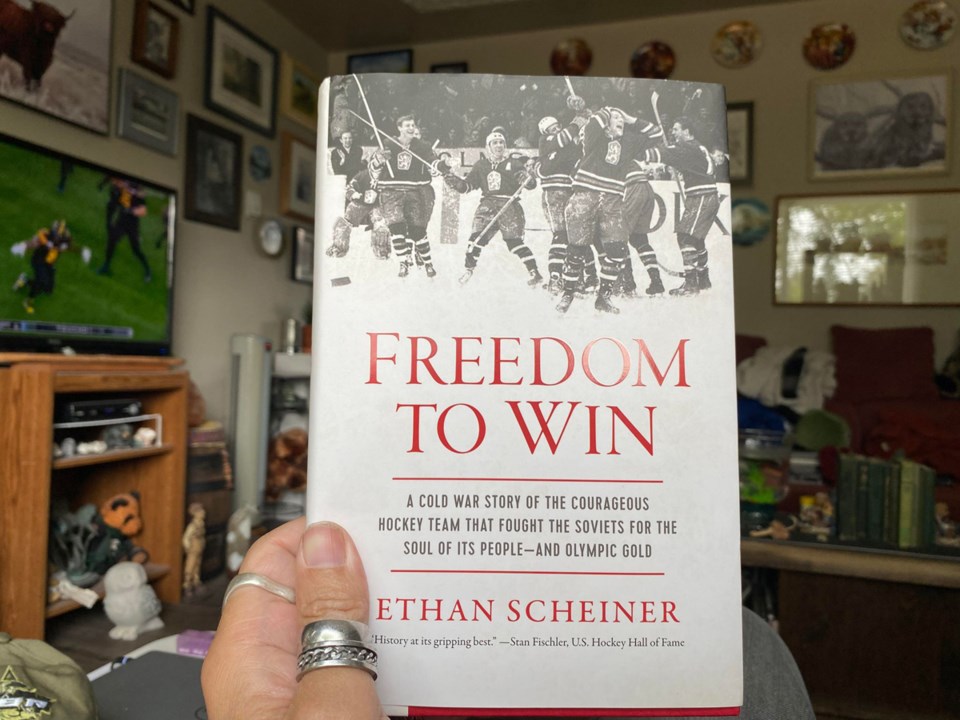YORKTON -
As Canadians we tend to look at hockey as our game, and certainly many sports fans shudder anytime this country loses an international game.
It’s also easy to think about hockey as merely a game.
Read Freedom to Win: A Cold War Story of the Courageous Hockey Team That Fought the Soviets for the Soul of Its People—And Olympic Gold by Ethan Scheiner and you come quickly to two realizations.
Firstly hockey matters outside of Canada, in this case proving very much to be the heart of the former Czechoslovakia as the nation rallied around its ice heroes.
And, secondly sport is often very much a part of a larger story than the score of games. In this case hockey became a symbol of hope for a nation under first Nazi rule and then the thumb of the former USSR.
In fact, in an interview with Scheiner the author noted the book is not just about hockey, but about how the sport became something for the people of a country under total control of other powers to look to as one area they could still fight to win and not lose all hope in that effort.
This book is very much a history book detailing the Russian invasion of Czechoslovakia, and it cannot be lost on the reader we have seen the story repeated with the invasion on Ukraine and the resulting war there.
“From the sudden invasion of Czechoslovakia by an armada of tanks and 500,000 Warsaw Pact soldiers, to a hockey victory over the Soviets that inspired half a million furious citizens to take to the streets in an attempt to destroy all representations that they could find of their occupiers, Freedom to Win tells a story that ranges from iconic moments in history to courageous individual stories,” details pegasusbooks.com. “We will witness the fearless escape by three brothers who make up the core of the national team. We will experience thrilling world championship games. We will watch as one brave player takes a stand and leads ten thousand people in a tear-filled rendition of the Czechoslovak national anthem amid chants of “freedom!” while a revolution rages in the streets of Prague. And we will cheer as the team takes on its nemesis one last time with the Olympic gold medal at stake.”
As a hockey fan I have to say I quickly became focused on the history and politics here, perhaps because many of the early on ice combatants for Czechoslovakia were not names I recognized, although the total control exerted by Russia and its puppets was startling to read about. It certainly reinforced just how fortunate we are in Canada and how ridiculous some are in suggesting we have lost our freedoms.
Hockey became a way to fight back against the overwhelming Russian force.
“The 1968-69 team grew unusually close, inspired by their common hatred of the USSR and the team's role in offering the country a chance for revenge,” writes Scheiner in the book. “The World Championship was no longer simply a sporting event. As the meaning of the games became clear, team captain Golonka bellowed, “Even if we have to die on the ice, we have to beat them!” To a man, the players shared the view.”
Certainly the topic is one that readers will recognize was important to the author, which is somewhat surprising given his background.
“Being a California boy this was not an obvious topic for me,” said Scheiner in an interview with Yorkton This Week.
But the author said he had always been a sports fan, and when he began to look for examples of where sport and politics intersected – like Jessie Owens competing at the 1936 Olympics in Berlin – he came to realize hockey had intersected with the politics of the ‘Cold War’ in another book.
“I thought this is perfect for my class, but it (the mention) ended after eight pages.”
Scheiner was not satisfied.
“I became totally obsessed with it,” he said.
In beginning to research the role of hockey in Czechoslovakia first under German rule and then after the Russian invasion in 1968, Scheiner found that Bobby Holik, a former NHL player from what is now Czechia was still living in the U.S.
Scheiner sent Holik a letter, admitting he doubted he would get a reply.
“Two weeks later Bobby called me,” he said.
The pair met and the trek toward a book was fully on.
The research process was hindered by the language barrier.
“Certainly it was a huge hurdle,” said Scheiner.
When he spoke to players such as Peter Statsny who spent time playing in North America English worked, but on trips to the former Czechoslovakia older players spoke no English, necessitating the use of an interpreter.
While there were hurdles, in the end Scheiner had too much information.
“In the first draft I sent to the publisher it was probably a 500-page book. It was all I could do to restrain myself,” he said.
So the edits and chopping began with the finished product still a robust book at 360 pages.
Therein lies one small issue with this otherwise completely compelling book, at 360 pages it gets a bit long. I was left ready for the end probably 40 pages before it actually came, so at times you may feel some drag on your interest level.
That said, in terms of the story’s importance in terms of hockey and history in what are now Czechia and Slovakia, is such that slogging through a few extra pages is not too great a hardship on the reader.
In the end the author said he is happy with the book.
“By the end this is the book I wanted to write,” said Scheiner, adding he ended up being “totally fine with what I cut.”
And I suspect readers will be more than pleased as well.

